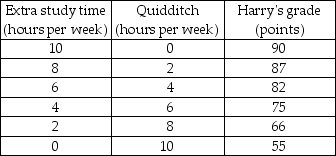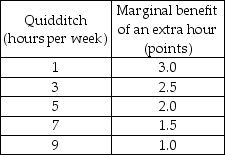

-Harry usually spends 10 hours a week playing Quidditch. However, his Defense Against the Dark Arts exam is coming and he needs more time to study for the exam. If he does not study at all, the lowest grade he will receive is 55. But Harry realizes that this grade is unacceptable and so he has to give up some of his Quidditch time. But how much? He asks his friend Hermione, who is very good at Magical Economics, to help him figure this out. Together, they come up with the schedules of Harry's possibilities and values in the tables above. Then Hermione quickly finds the solution. But Harry still looks puzzled. Help Hermione to explain her solution to Harry.
a) Draw Harry's production possibilities frontier with the Quidditch hours on the horizontal axis and Harry's grade, starting at 55, on the vertical axis.
b) What is the opportunity cost of the first two hours of Quidditch? What is the marginal cost of the 5th hour?
c) What is Harry's opportunity cost of raising his grade from 82 points to 87 points?
d) Draw Harry's marginal cost of playing Quidditch curve. What happens to the marginal cost if Harry spends more time playing Quidditch?
e) Draw Harry's marginal benefit from playing Quidditch curve. Describe the relationship between Harry's time spent playing Quidditch and the marginal benefit from playing Quidditch.
f) For how many extra hours did Hermione recommend Harry to study? Why? If Harry follows her advice, what grade will he expect? What do you think Hermione said when Harry asked why he should not spend more time playing Quidditch?
Definitions:
NAFTA
The North American Free Trade Agreement, a treaty between Canada, Mexico, and the United States that established a trilateral trade bloc in North America.
GATT
The General Agreement on Tariffs and Trade, a legal agreement between countries to promote international trade by reducing or eliminating trade barriers such as tariffs and quotas.
FTAA
The Free Trade Area of the Americas, a proposed agreement to eliminate or reduce trade barriers among all countries in the Americas, excluding Cuba.
Knowledge
The facts, information, and skills acquired through experience or education; the theoretical or practical understanding of a subject.
Q95: The opportunity cost of moving from point
Q114: In order to combat a recession, the
Q140: In the figure above, suppose that Mac
Q185: If Tom and Di specialize in producing
Q217: In one day, Sue can change the
Q218: A nation can produce at a point
Q226: George and Michael can gain from exchange<br>A)
Q236: Considering a PPF with health care services
Q368: In the figure above, both Joe and
Q382: If a country must decrease current consumption